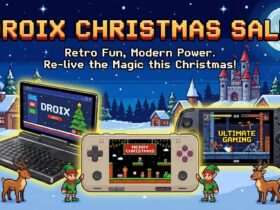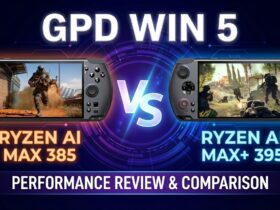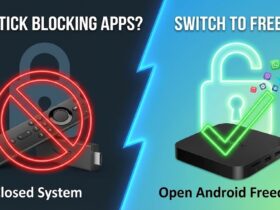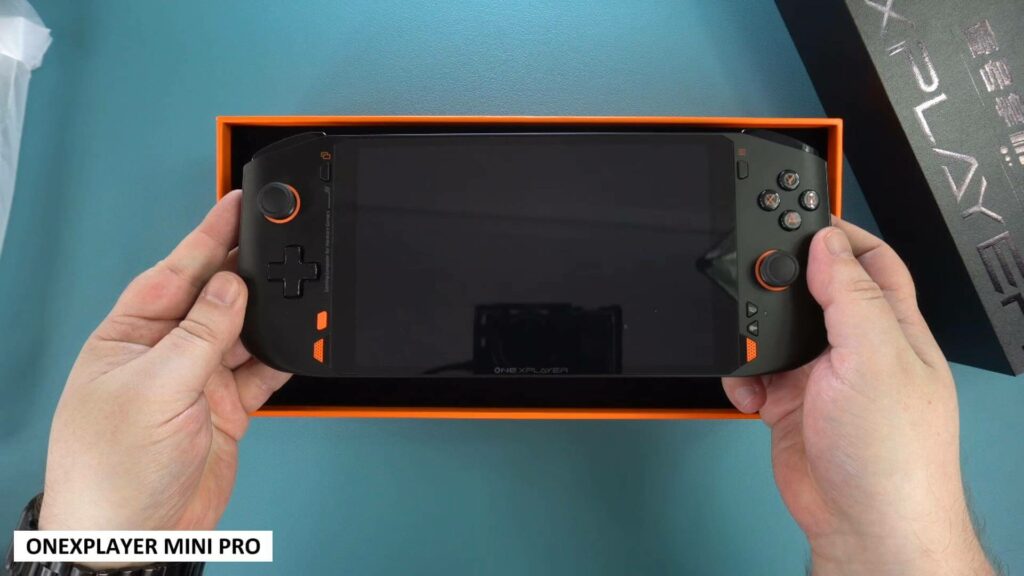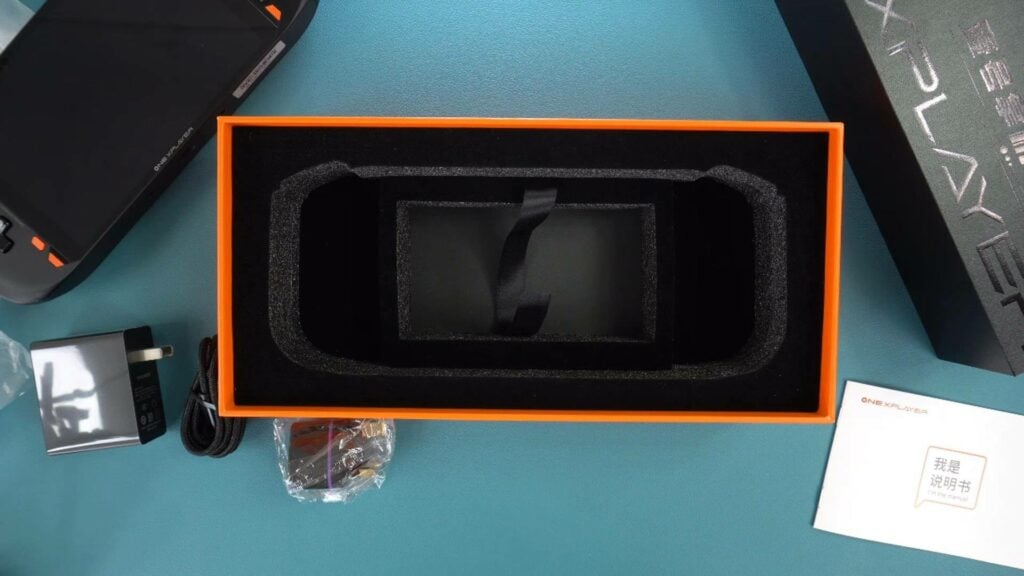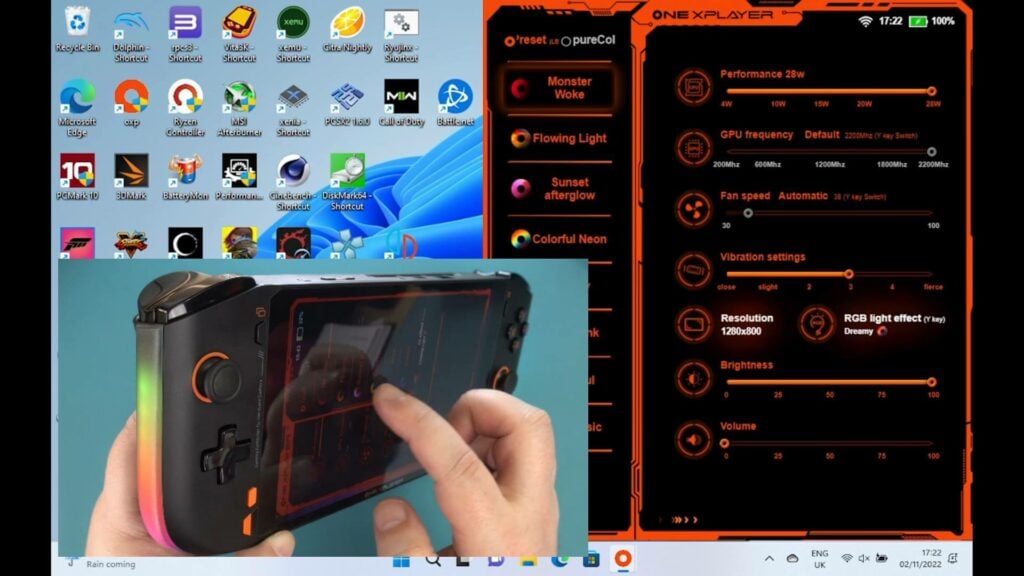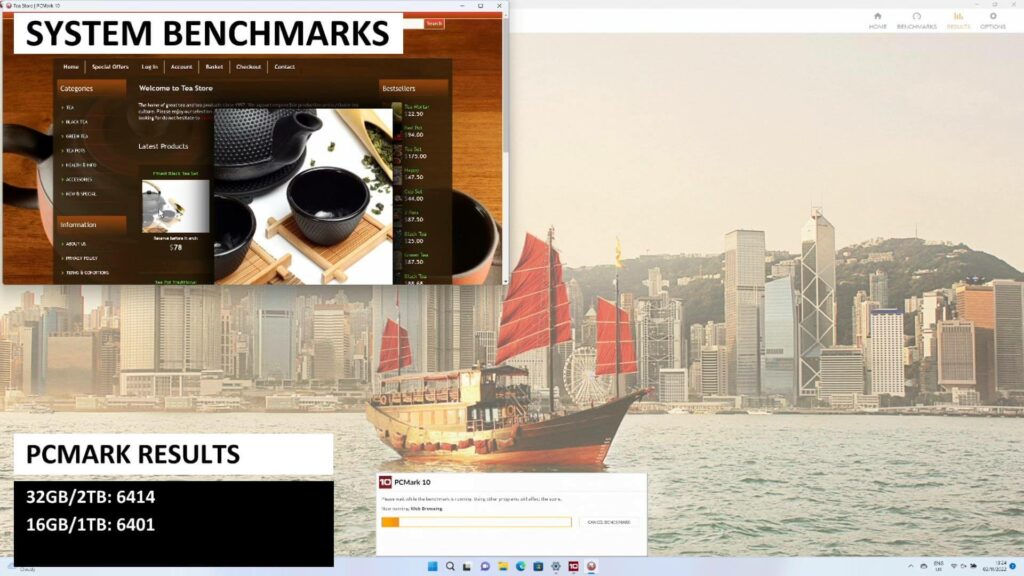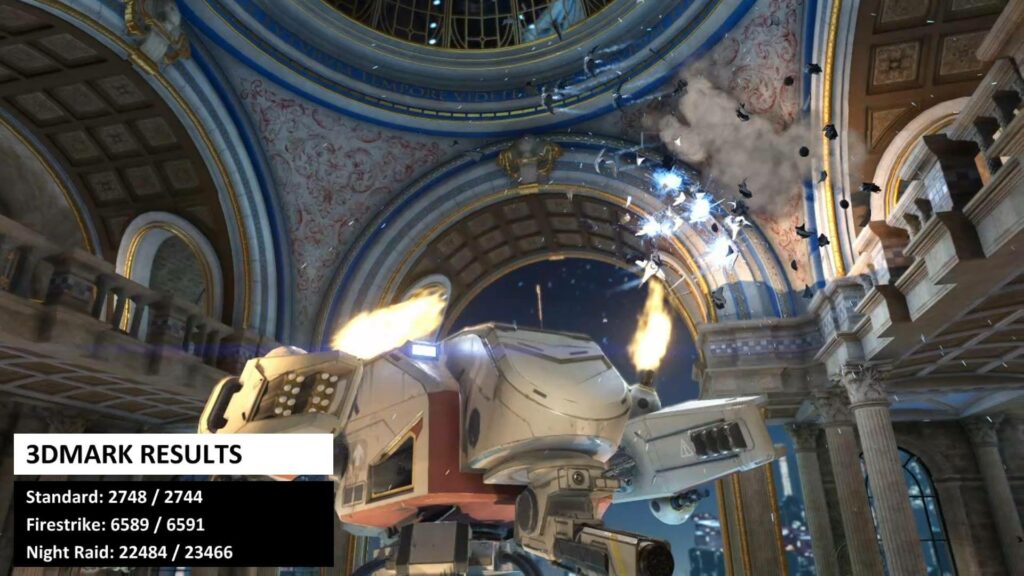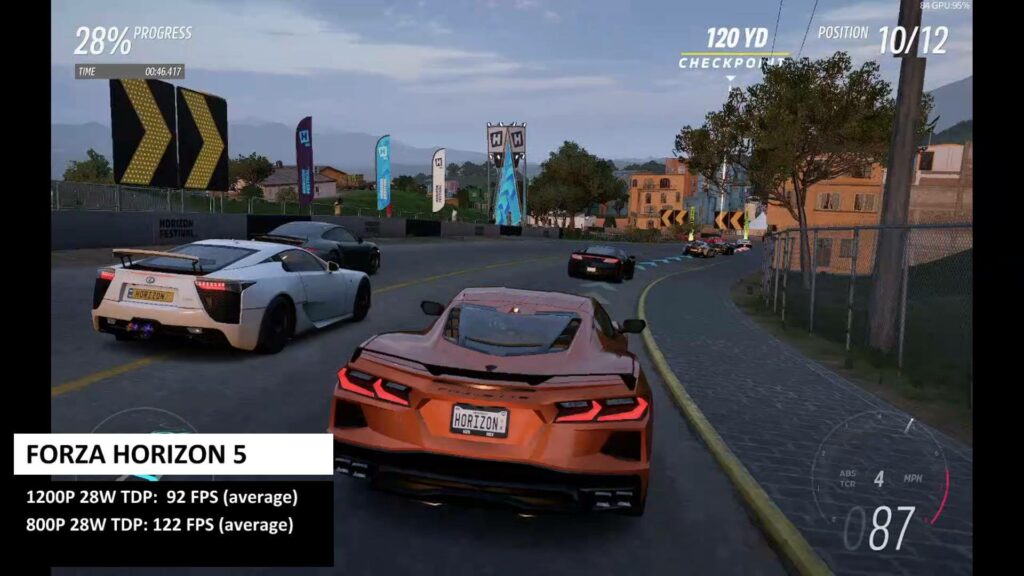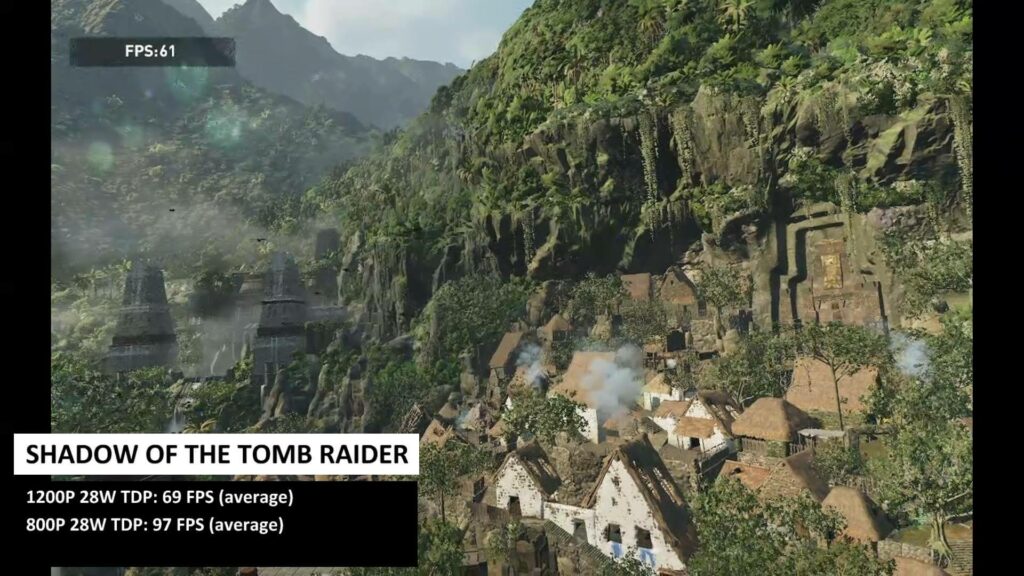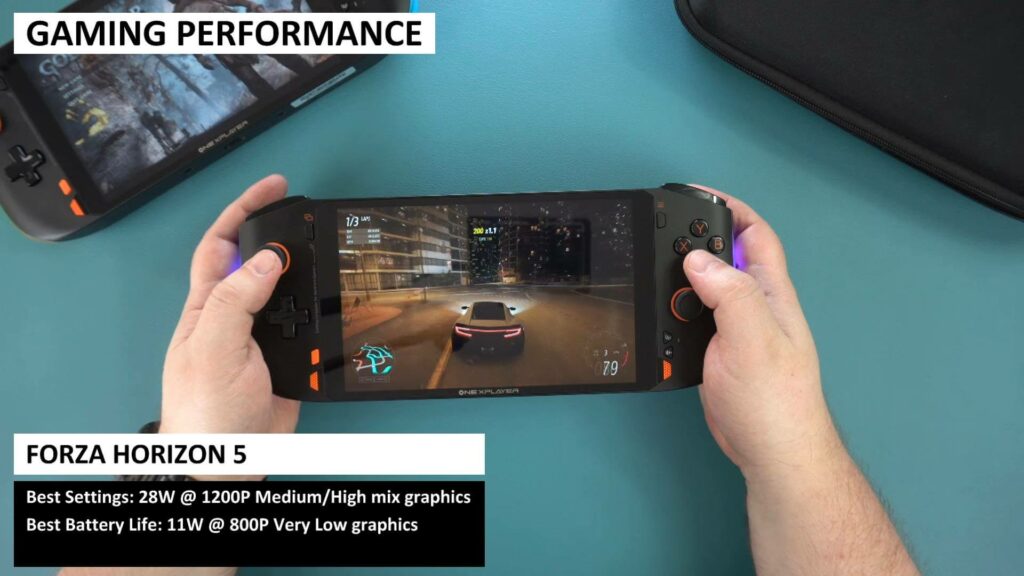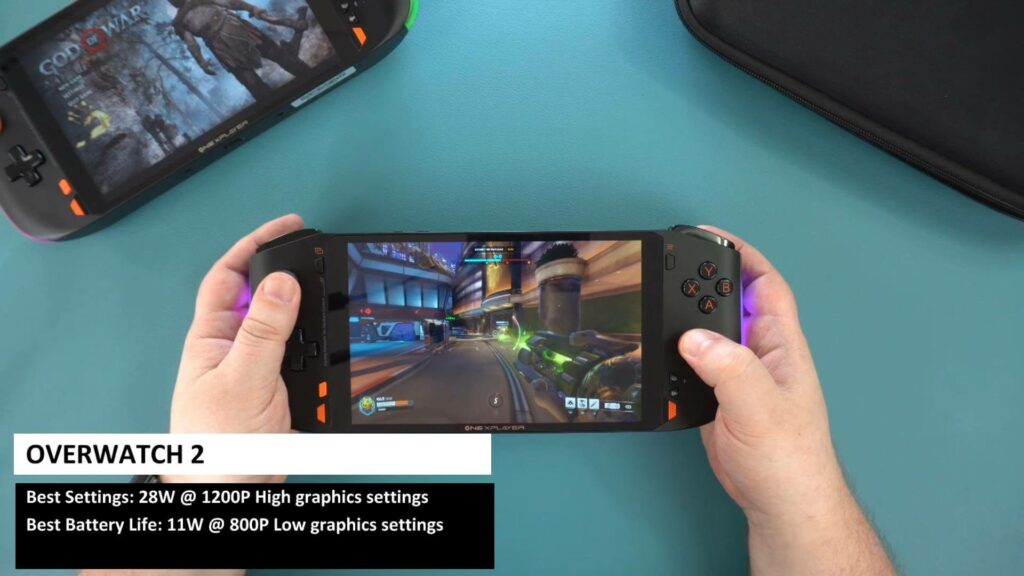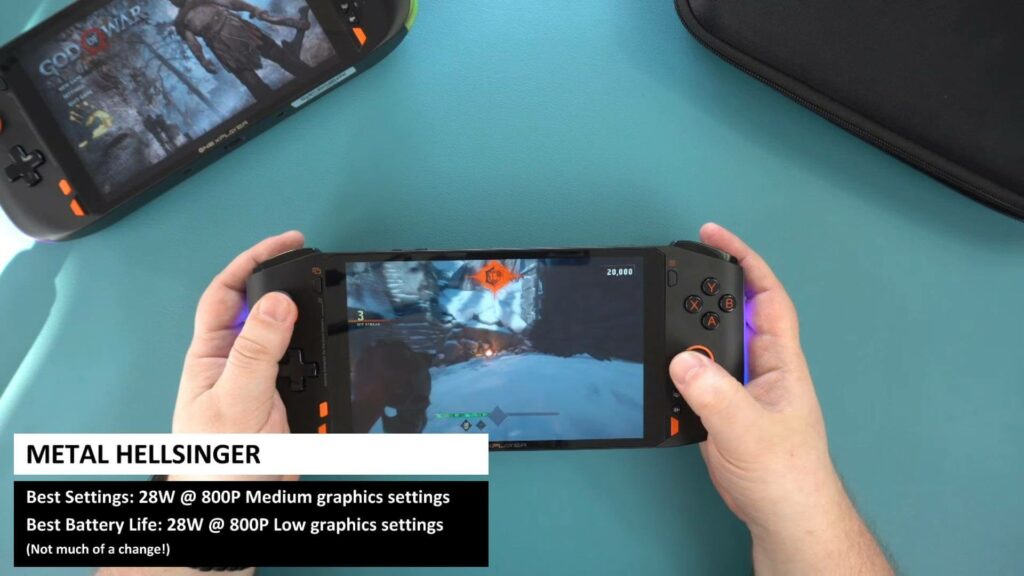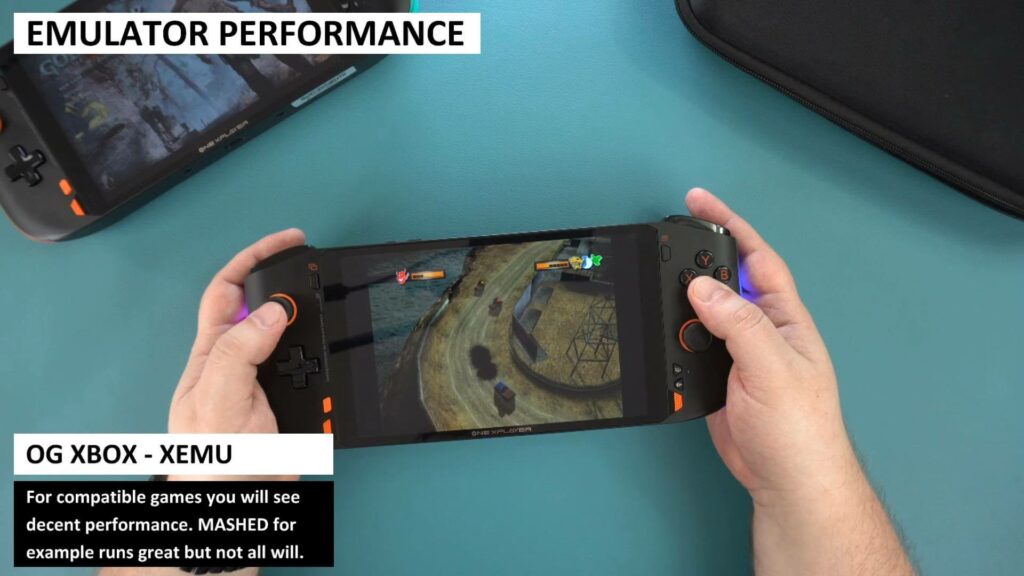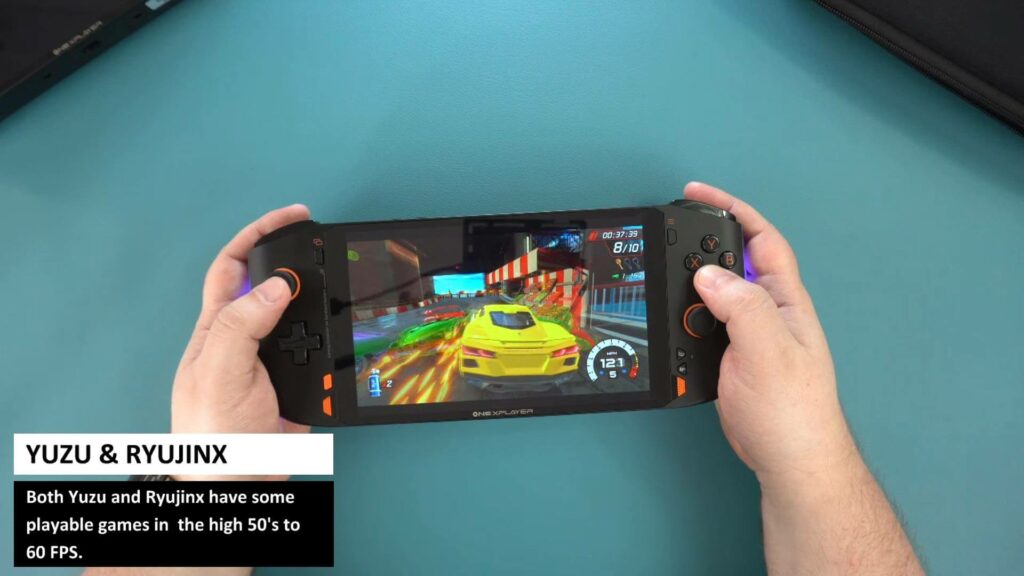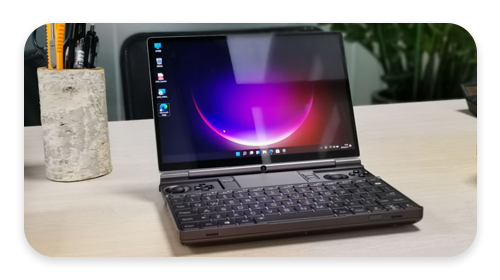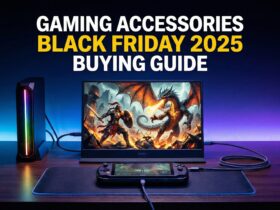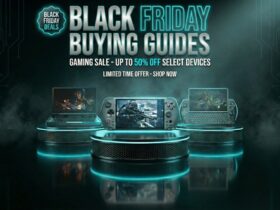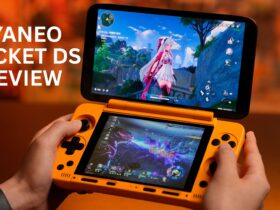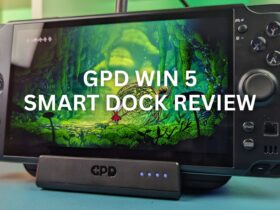ONEXPLAYER Mini Pro-anmeldelse
-
Design
(5)
-
Build Quality
(4.5)
-
Display
(5)
-
Performance
(5)
-
Features
(5)
-
Software
(5)
Sammendrag
En AMD Ryzen 7 6800U Windows-håndholdt spill-PC som kan kjøre de nyeste AAA Windows-spillene og avanserte emulatorer.
Totalt sett
4.9Brukeranmeldelse
( vote)Fordeler
- Rask AMD Ryzen 7 6800U-prosessor med 680M-grafikk
- 7″ berøringsskjerm av høy kvalitet
- Tilpassbar LED-belysning
- Ikke for stor eller tung
- Svært nyttig ONEXPLAYER-overleggsprogramvare
Ulemper
- Batterilevetiden ved full 28W TDP er ikke bra
Vil ONEXPLAYER Mini Pro håndholdt spill-PC med AMD Ryzen 7 6800U kunne måle seg med GPD WIN MAX 2? La oss finne ut av det når vi pakker ut, gir en oversikt, benchmarker og avslutter med spill- og emulatortester i vår ONEXPLAYER Mini Pro-anmeldelse!
ONEXPLAYER Mini Pro-gjennomgangsvideo
Utpakking av ONEXPLAYER Mini Pro
Inne i esken har vi den håndholdte PC-en ONEXPLAYER Mini Pro. Vi vil vise den i mer detalj om kort tid.
Under er det en brukerveiledning på kinesisk og engelsk.
Inne i pappesken finner du en USB-lader og en USB Type-C-ladekabel. Vi inkluderer riktig adapter for ditt land.
Oversikt over ONEXPLAYER Mini Pro
Den håndholdte spill-PC-en ONEXPLAYER Mini Pro måler 4,9 x 4,17 x 0,90 (12,6 x 10,6 x 2,3 cm) og veier 599 g. Den 7-tommers IPS-skjermen med berøringsskjerm har en opprinnelig oppløsning på 1920×1200. Den har god lysstyrke, og fargene ser flotte ut. Ikke like bra som en OLED-skjerm, men likevel veldig bra.
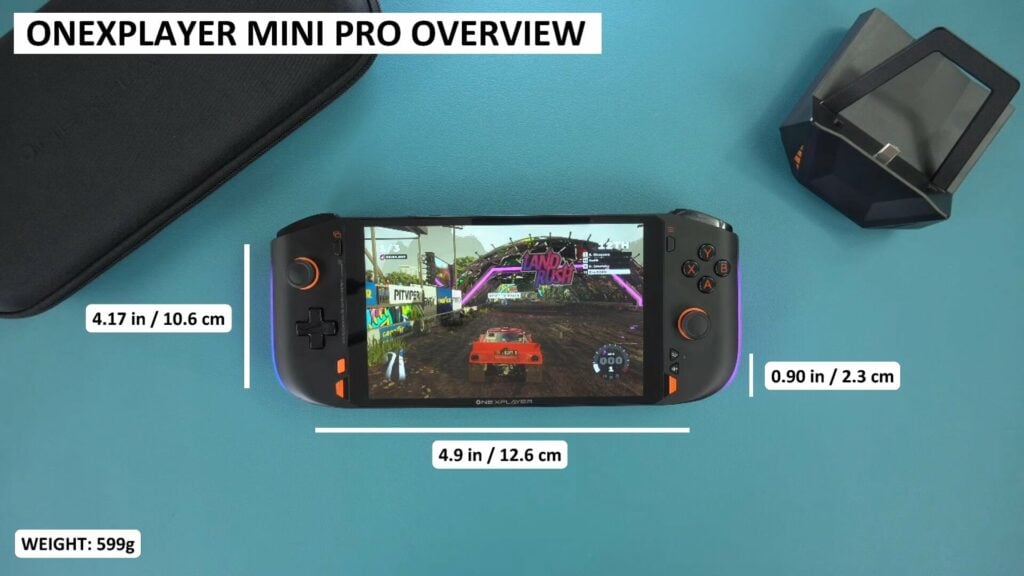
Du har de vanlige spillkontrollene, inkludert Hall Sensor-analoge pinner, D-Pad og knapper. Det er ekstra knapper nederst i hjørnene på skjermen for å vise skrivebordet, veksle mellom skjermtastaturet og få opp ONEXPLAYER-overleggsappen.
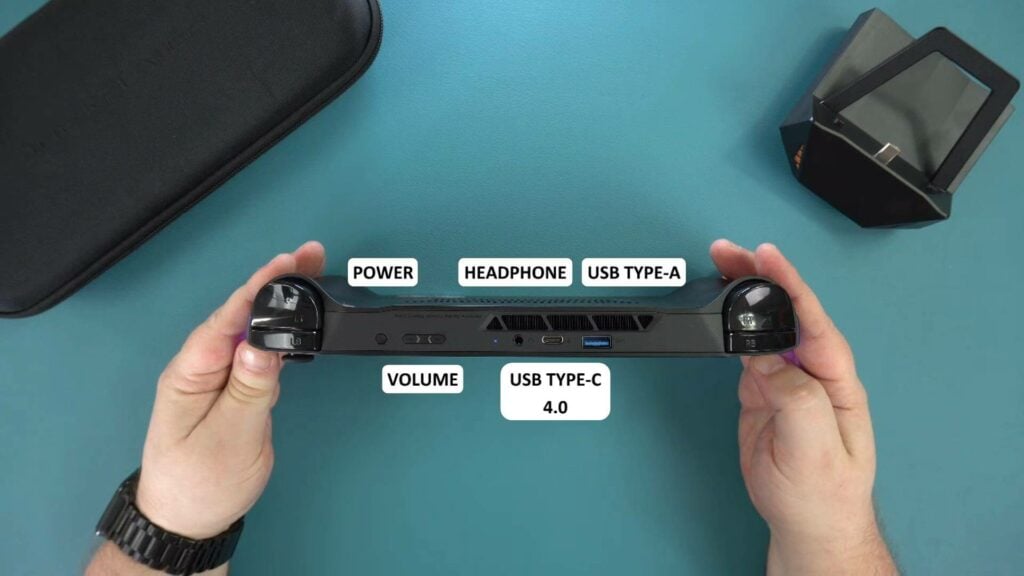
Toppen av Mini Pro har to skulderknapper og to lineære utløserknapper. Det er strømknapper, volumkontrollknapper og en 3,5 mm hodetelefonport. USB Type-C 4 kan brukes til lading eller tilkobling av eksterne enheter, for eksempel en eGPU. Det finnes også en USB Type-A 3.0-port.
Bunnen har en USB Type-C-port som også kan brukes til lading eller tilkobling av eksterne enheter, for eksempel ONEXPLAYER Mini-dokkstasjonen. Vi vil vise dokkingstasjonen i mer detalj i en egen kort video.
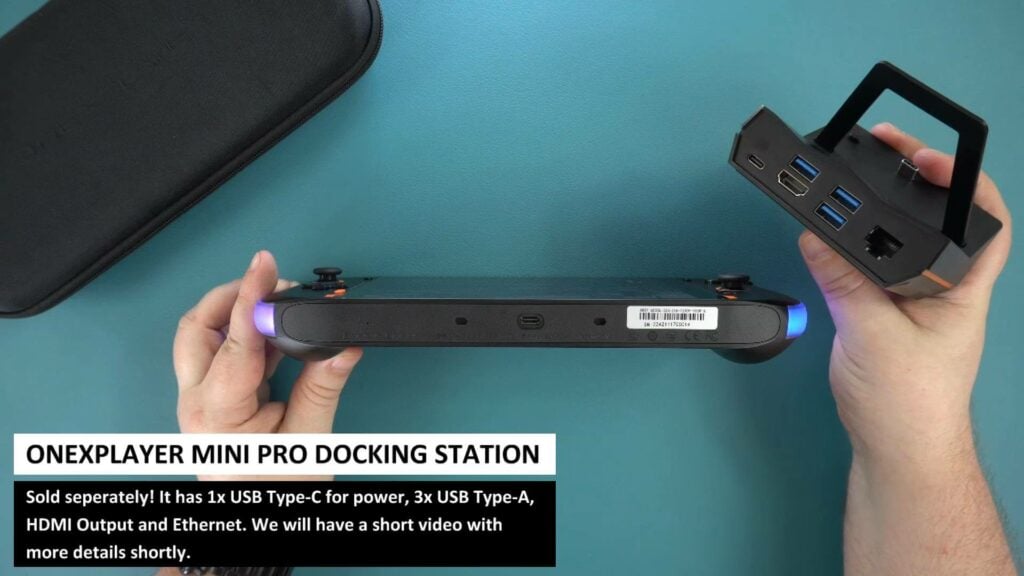
På sidene er det LED-belysning som kan konfigureres i den medfølgende programvaren.
Tekniske spesifikasjoner for ONEXPLAYER Mini Pro
| CPU | AMD Ryzen 7 6800U, Zen 3-arkitektur, 8 kjerner, 16 tråder, 4,7 GHz maks turbofrekvens, opptil 28 W TDP |
| GPU | Radeon 680M-grafikkort |
| DISPLAY | 7 tommers FHD IPS-skjerm, 1920 x 1200, 323 PPI 10-punkts Multi-Touch |
| RAM | 16 GB LPDDR5-6400 32 GB LPDDR5-6400 |
| OPPBEVARING | 1 TB M.2 2280(NVMe)-lagring, PCle 3.0 x4 2 TB M.2 2280(NVMe)-lagring, PCle 3.0 x4 |
| KOMMUNIKASJON | Wi-Fi 6 Bluetooth 5.0 |
| DIMENSJONER/VEKT | 1260 mm x 106 mm x 23 mm / 599 g (21,83 oz) |
| BATTERI* | 48wh høykapasitetsbatteri IDLE @ 28W TDP: 4 timer og 48 minutter FULL BELASTNING @ 28W: 1 time og 12 minutter |
| VENTILATORSTØY*" | 68 dB |
| TEMPERATUR*" | 52 °C |
*På våre batteritester lot vi den gå på tomgang ved 28 W TDP, og vi fikk en tid på 4 timer og 48 minutter. Og med Cinebench kjørt i en loop fikk vi 1 time og 12 minutter. Husk at dette er ved full CPU-belastning på den høyeste offisielt støttede TDP.
""Under kjøring av Cinebench målte vi en høyeste temperatur på 52 grader og en høyeste viftestøy på 68 desibel.
ONEXPLAYER Overlegg
Ved å trykke på ONEXPLAYER-knappen nederst til høyre på den håndholdte spill-PC-en får du opp et overlegg som du kan få tilgang til når som helst, også mens du spiller spill.
Herfra kan du raskt og enkelt endre TDP, vibrasjon, skjermoppløsning, LED-lysmønstre, lysstyrke og volum. Det er veldig nyttig og definitivt et kjærkomment tillegg til ONEXPLAYERs håndholdte enheter.
Systembenchmarks
For systembenchmarkene har vi 16 GB- og 32 GB-modellene samt vår nylig anmeldte GPD WIN MAX 2. Vi har også et pre-produksjonseksemplar av AOKZOE A1, og referanseresultatene for A1 er kun til referanse, siden den håndholdte enheten ikke er ferdigstilt. Vi tester ved 28 W TDP, og alle system- og spillbenchmarks kjøres bare én gang, med mindre det er et merkbart problem, bruker vi disse resultatene.
PCMark
I PCMark-referansen fikk vi en samlet poengsum på 6 414 og 6 401 for henholdsvis 32 GB- og 16 GB-modellene. Det er knapt noen forskjell i ytelse her, noe som er godt å se.
3DMark
For ONEXPLAYER Mini Pro og 3DMark i Time Spy-testen får vi poengsummer på 2,748 og 2,744. For Firestrike får vi 6,589 og 6,591 Og for Night Raid får vi poengsummer på 22484 og 23466
Det er en merkbar forskjell på 4 % på Night Raid, men med tanke på at det er den eneste så langt, kan vi kjøre benchmarken på nytt og få lignende resultater.
Cinebench
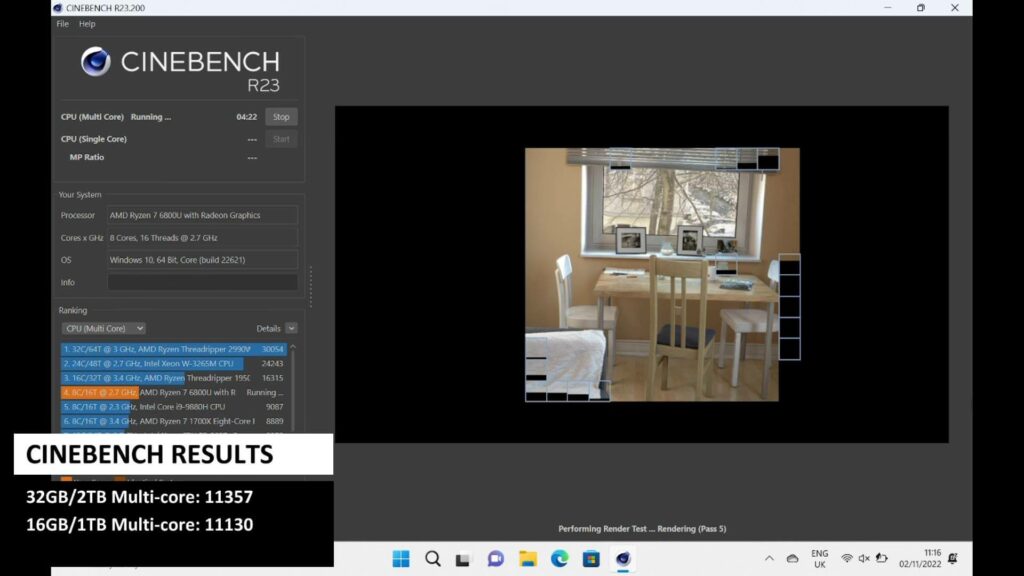
For vår siste benchmark kjører vi Cinebench, som tester CPU-enes enkeltkjerne- og flerkjerneytelse. På flerkjernereferansen får vi en score på 11 357 og 11 130.
Benchmarks for spill
Vi fortsetter vår ONEXPLAYER Mini Pro-anmeldelse med noen spillbenchmarks. For våre spillbenchmarks har vi endret testformatene våre. Fra nå av vil vi teste ved 800P ved 28W, samt 11, 20 og 28W ved enhetens opprinnelige oppløsning. På denne måten kan vi sammenligne ulike håndholdte enheter med en felles delt oppløsning på 800P for å oppdage eventuelle ytelsesforskjeller. Den opprinnelige oppløsningen varierer mellom håndholdte enheter, og dette vil fortelle oss hva ytelsen vil være ved ulike TDP-er for det spesifikke produktet.
Referanseverdiene for begge var stort sett på nivå med hverandre, så vi vil kjøre spillreferansene på 32 GB/2 TB-modellen.
Forza Horizon 5
Vi kjører Forza Horizon 5-referansen på svært lave innstillinger.
Resultatene er på skjermen med 1200P-oppløsning på 28W og får en veldig spillbar 92 bilder per sekund. Ved 800P med de samme innstillingene får vi 122 FPS, noe som er flott!
Når vi senker TDP på 1200P, får vi 85 FPS ved 20W og et ganske fall ved 11W med 49 FPS.
Shadow of the Tomb Raider
Til tross for at spillet begynner å dra på årene, er Shadow of the Tomb Raider fortsatt et krevende spill som egner seg godt for benchmarks.
Ved 28W 1200P på de laveste grafikkinnstillingene får vi en spillbar 69 FPS, og ved 800P får vi fantastiske 97 FPS.
Ved 1200P på 20W TDP fikk vi 61, og ved 11W fikk vi 34 bilder per sekund.
Cyberpunk 2077
For våre Cyberpunk 2077-benchmarks kjører vi på standardinnstillingene for lav grafikk og tekstur.
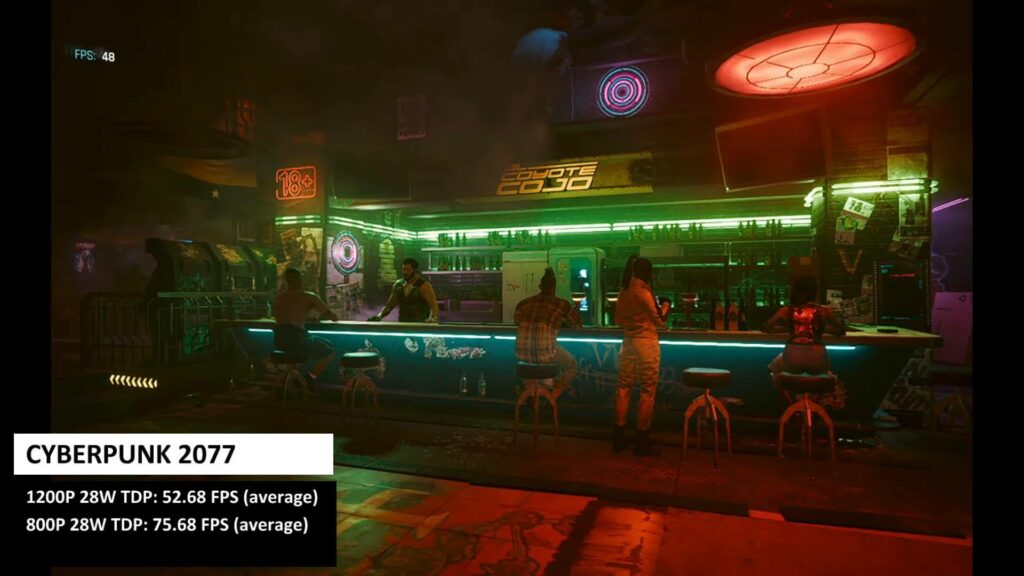
Ved 1200P med 28W TDP får vi en gjennomsnittlig bildefrekvens på 52,68, og ved 800P får vi 75,68 FPS.
For 1200P ved 20W fikk vi 44,83 og for 11W fikk vi 23,13 bilder per sekund.
Call of Duty Modern Warfare 2
Vi kjører Call of Duty Modern Warfare 2 på standard minimale grafikkinnstillinger uten oppskalering.
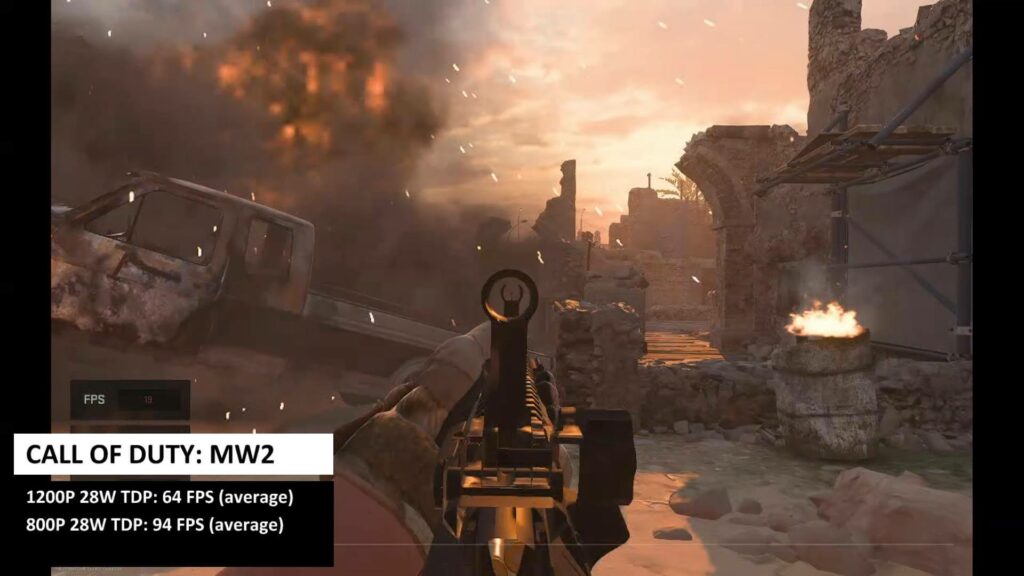
Ved 1200P på 28W får vi en gjennomsnittlig bildefrekvens på 64, og ved 800P får vi 94.
Ved 20W fikk vi en ikke langt unna 28W på 58 FPS, og ved 11W fikk vi 32 FPS
Sammendrag av referanseindeksen
Som en del av vår ONEXPLAYER Mini Pro-gjennomgang viser vi først et sammendrag av ONEXPLAYER Mini Pro-referanseresultatene for håndholdte PC-er med de ulike TDP-ene. Resultatene for 32 GB- og 16 GB-modellene er i hovedsak de samme, så vi trenger ikke å bekymre oss for mye om ytelsesforskjeller. .
| 28 W TDP | 20 W TDP | 11 W TDP | |
| PCMARK | 6414 | ||
| 3DMARK | 2748 | ||
| CINEBENCH | 11357 | ||
| FORZA HORIZON 5 | 92 FPS | 85 FPS | 49 FPS |
| TOMB RAIDER | 69 FPS | 61 FPS | 34 FPS |
| CYBERPUNK 2077 | 52,68 FPS | 44,83 FPS | 23,13 FPS |
| CALL OF DUTY: MODERN WARFARE 2 | 64 FPS | 58 FPS | 32 FPS |
Vi kan se en stor forskjell i ytelse mellom 11 W og 20 W TDP, men når vi øker den til 28 W, er det en relativt mindre forskjell.
AMD Ryzen 7 6800U-prosessoren er litt strømkrevende i denne forbindelse, og kombinert med batteriet betyr det at spilløktene kan bli korte når du kjører med 28 W TDP. Du kan kjøre på rundt 25W TDP for best mulig balanse mellom ytelse og batterilevetid, men ideelt sett vil du ha TDP så lav som mulig.
Nå sammenligner vi referanseresultatene med GPD WIN MAX 2 og et førproduksjonseksemplar av AOKZOE A1. A1-referanseresultatene er ikke basert på den endelige maskinvaren, og bør kun brukes som referanse.
| ONEXPLAYER MINI PRO | GPD WIN MAX 2 | AOKZOE A1 | |
| PCMARK | 6414 | 6346 | 6496 |
| 3DMARK | 2748 | 2805 | 2720 |
| CINEBENCH | 11357 | 11142 | 10899 |
| FORZA HORIZON 5 | 92 FPS | 94 FPS | 92 FPS |
| TOMB RAIDER | 69 FPS | 69 FPS | 65 FPS |
| CYBERPUNK 2077 | 52,68 FPS | 48,24 FPS | 48,73 FPS |
| CALL OF DUTY: MODERN WARFARE 2 | 64 FPS | 65 FPS | 59 FPS |
Totalt sett kommer ONEXPLAYER Mini Pro håndholdt PC ut omtrent midt mellom de to andre. Vi kunne kjørt alle referansetestene flere ganger og fått forskjellige poengsummer, men generelt er det ikke så stor forskjell i ytelse mellom de tre. Dette er bra for oss, ettersom det hjelper oss med å ta beslutningen om hva vi skal kjøpe, ikke basert på den beste ytelsen, men på design, skjermstørrelse og så videre.
Spillets ytelse
Vi vil nå prøve noen spill på spillbare grafikknivåer. Når det har vært mulig, har vi valgt 1200P-oppløsning ved 28 W TDP for de beste innstillingene, og 800P ved laveste spillbare TDP for best batterilevetid på den håndholdte spillenheten.
Forza Horizon 5
Vi vet at Forza Horizon 5 kjører bra på AMD-prosessorer, så vi kan kjøre dette på 1200P på de svært lave innstillingene ved 25W TDP uten problemer.
Du kan øke grafikkinnstillingene til en blanding av Medium/High og holde det meste over 60 FPS. Eller senk den til 800P-oppløsning og spill den på svært lave innstillinger med bare 11 W TDP, noe som er fantastisk!
Overwatch 2
Vi siktet mot en stabil 60 FPS ved 1200P. Med 28W TDP kan vi komme opp til høye innstillinger uten oppskalering og for det meste få 60 FPS.
Hvis du vil spare litt batteritid, kan du gå til 800P-oppløsning ved 11 W med lave grafikkinnstillinger.
Metall Hellsinger
Vi klarte ikke å få Metal Hellsinger til å kjøre 60FPS med 1200P oppløsning, så vi gikk ned til 800P, noe som ga oss litt pusterom.
Du kan kjøre det på lave innstillinger for å holde det over 60 FPS. Eller støte den opp til Medium grafikk for noen sporadiske fall under 60FPS. Personlig ville jeg gått for de lave innstillingene, da det kan ødelegge timingen din hvis det er litt forsinkelse.
Call of Duty Modern Warfare 2
For Call of Duty Modern Warfare 2-kampanjen bruker vi de minimale grafikkinnstillingene ved 1200P-oppløsning, og vi fikk bildefrekvenser mellom 30 og 60.
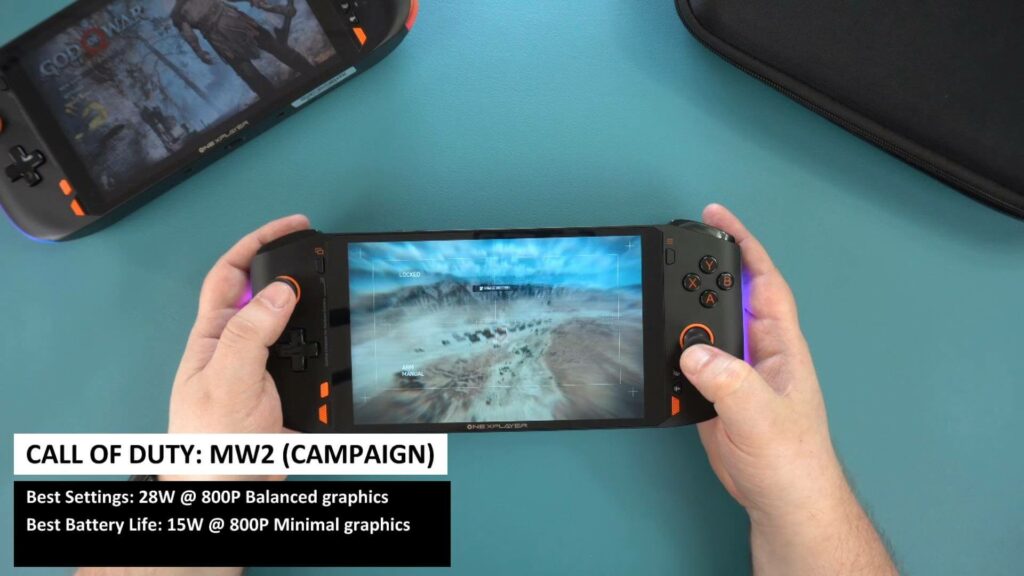
Så vi har gått med 800P ved 28W balansert grafikk som får oss over 60 FPS. Du kan senke TDP til rundt 15W og senke grafikken til minimal for å spare batteri.
For flerspiller vil du sannsynligvis ønske å kjøre på 28W 800P på minimal grafikk for å få høyest FPS for å få drapene dine raskere 🙂
Emulatorens ytelse
Vi fortsetter vår ONEXPLAYER Mini Pro-anmeldelse med å se på emuleringsytelsen. Den er generelt veldig lik GPD Win MAX 2 som vi nylig anmeldte.
Alle de klassiske 8- og 16-bits konsollene vil naturligvis fungere fint ved lav TDP uten problemer. Dette gjelder også neste generasjon med PlayStation og Dreamcast-æraen.
Vi vil kort gå gjennom noen av de nyeste konsollene for å se på ytelsen. Husk at mange av disse emulatorene er under aktiv utvikling, så kompatibilitet og ytelse kan variere mellom ulike utgivelser.
Xbox - Xemu-emulator
For kompatible spill vil du se anstendig ytelse. Vårt favorittspill MASHED får solide 60 FPS. Ikke alle spill kjører bra, så kjørelengden kan variere.
Citra-emulator
For Citra-emulatoren ser vi blandet ytelse. Spill som Sonic Generations har de første forsinkelsene i shaderbufferen, mens andre spill som Ridge Racer stort sett kjører fint. Det er mange spillbare spill for emulatoren å sjekke ut.
Xbox 360 - Xenia-emulator
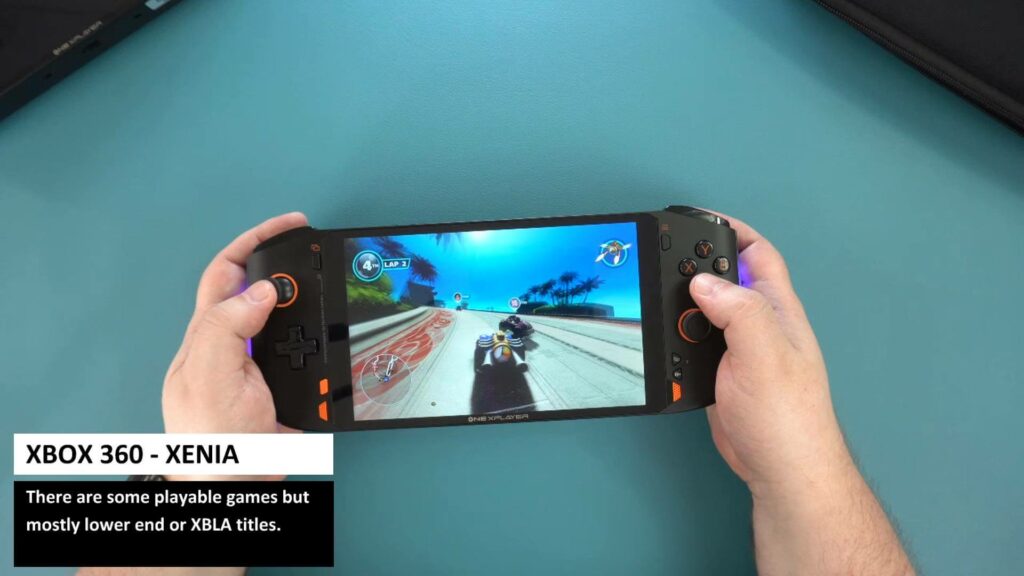
For kompatible spill er det noen anstendig ytelse, men emulatoren er ikke helt der ennå for perfekt spilling. På Sonic Racing får vi for det meste hele 30 FPS, men det er grafikkfeil. Andre spill som Project Gotham Racing ligger på rundt 20 bilder per sekund.
PlayStation 3 - RPCS3-emulator
PlayStation 3 begynner å komme til et punkt der mange spill er spillbare. På Wipeout HD får vi stort sett høye 50 til 60 FPS med noen mindre forsinkelser. På Tekken 6, bortsett fra noen sporadiske lags i shader caching under nivåintroen, kjører spillet på solide 60.
Yuzu & Ryujinx-emulatorer
For Yuzu bruker vi Vulkan-bygningen og får anstendige resultater. Cruis'n Blast kjører på høye 50 til 60-tallet med noen mindre forsinkelser nå og da. Andre spills ytelse og kompatibilitet varierer, så ikke alt fungerer, men det er et anstendig antall spillbare spill.
Sammendrag
Vi avslutter vår ONEXPLAYER Mini Pro-anmeldelse med mine egne tanker. ONEXPLAYER Mini Pro for meg er et stort skritt opp fra forrige generasjon. Hvis vi tenker tilbake til for rundt et år siden, slet de fleste håndholdte med å kjøre mange av de nyeste spillene med behagelige innstillinger. Nå kan vi laste opp et spill og ikke bekymre oss for mye om å finjustere og optimalisere.
Vi må imidlertid fortsatt bekymre oss for batterilevetiden, litt over én time med full belastning ved 28 W TDP er ikke bra. Hvis du spiller spill som krever mye strøm når du er ute og reiser og ikke er i nærheten av en strømforsyning, kan det hende du må gå tilbake til å finjustere og optimalisere spillene.
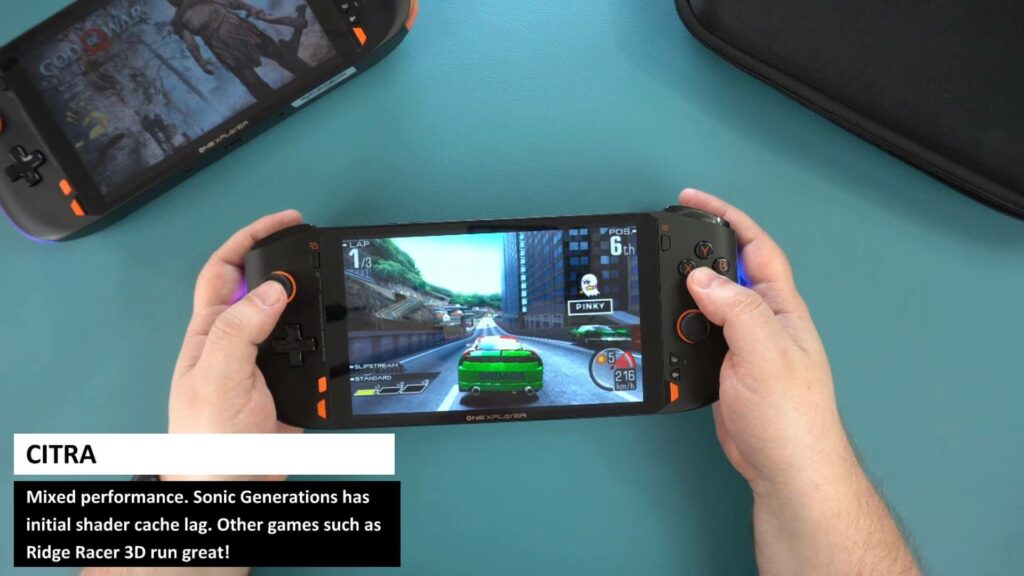
Mini Pro har akkurat passe størrelse for en håndholdt PC. Den er behagelig å spille på over lengre tid, kontrollene er innen rekkevidde og ikke for trangt plassert. Skjermstørrelsen er perfekt, med en oppløsning på 1200P ser spillene veldig bra ut, og det er nok skjerm til å se tekst uten problemer. Også bonuspoeng for ONEXPLAYER Overlay, det fungerer utmerket og gjør det mye raskere å utføre ofte brukte funksjoner.
Ytelsen i spill og emulatorer er svært god. AMD Ryzen 7 6800U-prosessoren åpner opp for langt flere muligheter for økt ytelse i spill. Det kan bety alt fra å skru opp grafikkinnstillingene på eldre spill til å kjøre nyutgitte spill som faktisk er spillbare.
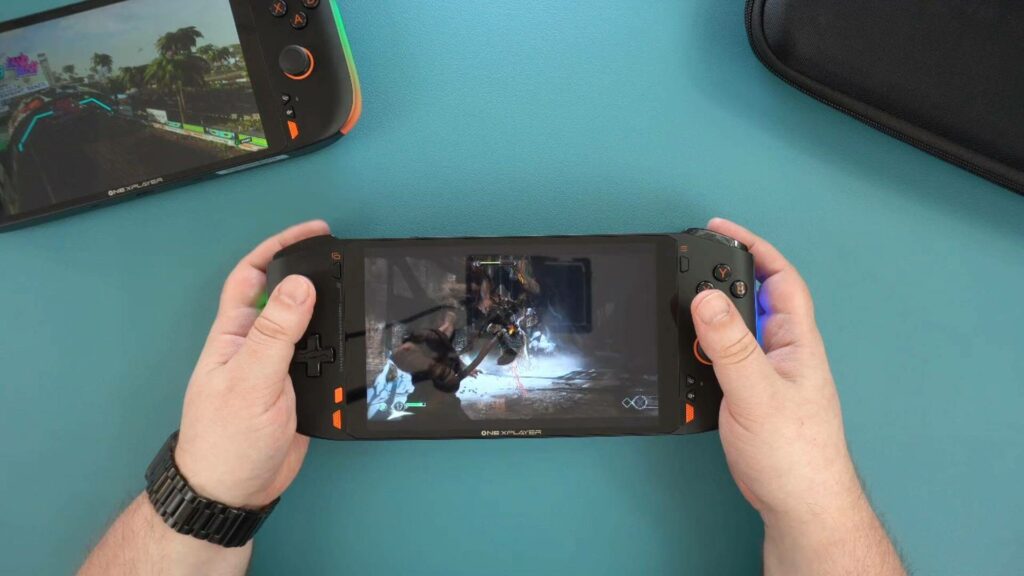
Vi har fortsatt GPD WIN 4 og AYANEO 2 håndholdte spill-PC-er å komme, men vi forventer at ytelsen vil være omtrent den samme som de tre enhetene som er nevnt i dag. Vil du kjøpe ONEXPLAYER Mini Pro eller noe annet? La oss få vite det i kommentarfeltet!
Hvor kan jeg kjøpe en ONEXPLAYER Mini Pro?
Når du snakker om å kjøpe en, kan du lære mer og kjøpe ONEXPLAYER Mini Pro her. Bruk rabattkoden OXPMP5 i kassen for å få rabatt!
Det avslutter vår ONEXPLAYER Mini Pro-anmeldelse, vi håper du har funnet det nyttig. La oss få vite hva du synes om den håndholdte spill-PC-en i kommentarfeltet!
[azp_custom_product id="43″]



